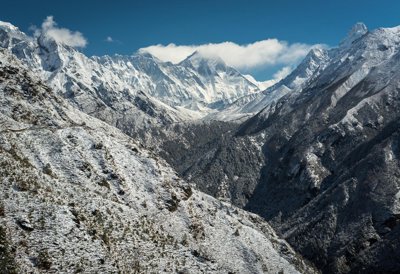Some food crops convert just one percent of the Sun's energy into edible food. If we can improve the process of photosynthesis we can grow more food on less land. Tom Heap visits a Yorkshire greenhouse to meet the team from Glaia with a cunning idea to do just that.
Back in the studio, Dr Tamsin Edwards, climate scientist and Fellow of the Society, considers the potential impact on our global carbon emissions.
What our experts say
We asked Society Fellow Professor Vincent Gauci, a Professorial Fellow in Geography and Environmental Sciences at the University of Birmingham, to offer some observations on the potential of enhanced photosynthesis in food crops. His points take some of the themes of the programme a step further:
An additional benefit of this approach is that the greater productivity for crops could mean land might be returned to forest from agriculture. A 20% boost in crop productivity could mean a corresponding 'land dividend' and a smaller agricultural area that would be more efficient to farm. Globally, this reduced need for crop land would be the equivalent of taking crop growing areas back to the 1950s. Regrowing forests, particularly in the tropics, can take up a tremendous amount of carbon from the atmosphere. Net primary productivity of forests in the most productive tropical forests ranges from up to 12-22 tonnes of carbon taken up in each hectare every year. Collectively, for the tropics alone, and with much uncertainty around this figure, this could mean an upper estimate of an additional 4 Gt (gigatonnes) carbon taken up each year.
Further reading
-
Ritchie, H., Roser, M. (2019) Land Use, Our World in Data
-
Clark, D., Brown, S., Kicklighter, D. et al. (2001) Net Primary Production in Tropical Forests: An Evaluation and Synthesis of Existing Field Data. Ecological Applications 11(2), pp.371-384
About the series
39 ways to save the planet is a new radio series by BBC Radio 4 developed in partnership with the Society and broadcast in 2021. It showcases 39 ideas to relieve the stress that climate change is placing on the Earth. In each 15 minute episode Tom Heap and Dr Tamsin Edwards meet the people behind a fresh and fascinating idea to cut the carbon.
Over the course of 2021, the Society will be producing events and digital content to accompany the series.
Episode 10: Phenomenal photosynthesis

Featured card image: BBC
Featured banner image: Vadim Gromov/Unsplash
There is also the possibility of widening the enhanced BECCS approach to other systems, such as forest plantations (provided that nutrients and water availability are not limiting productivity). If done truly at scale, this approach could be considered a form of geoengineering.
